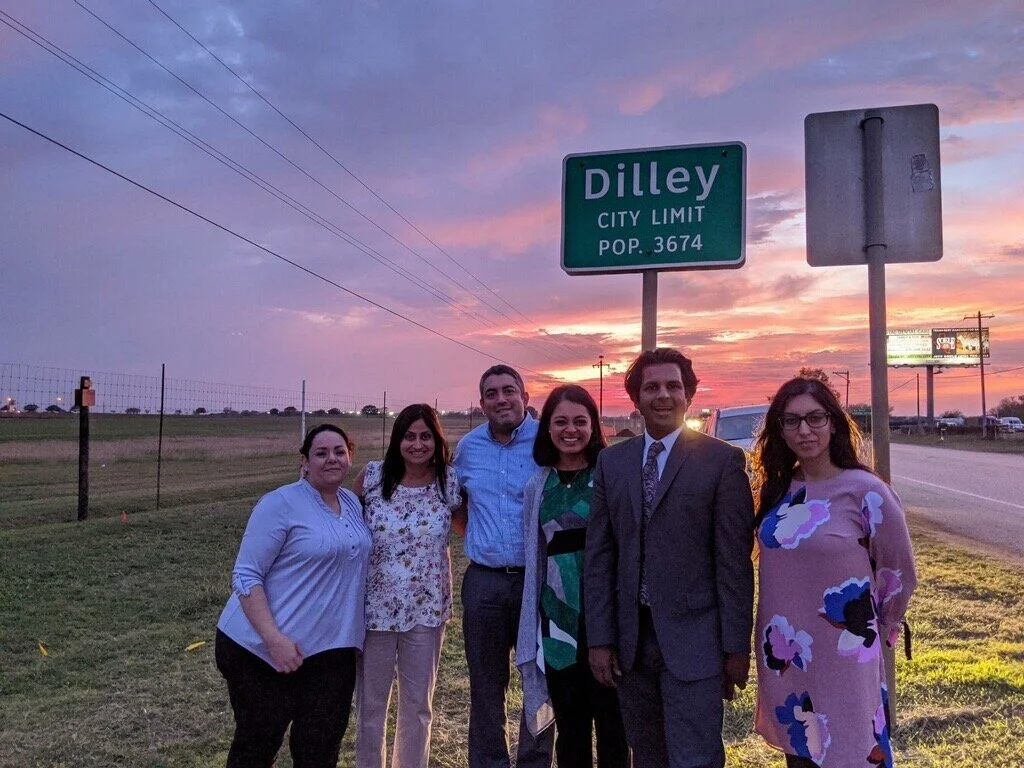The Dilley Project: Protecting Immigrants’ Rights at the Southern Border
The story of immigration binds the South Asian experience in the United States of America. As members of the bar obligated to ensure access to justice, members of the South Asian Bar Association of North America (SABA) with support from the South Asian Bar Association of North America Foundation (SABA Foundation), provided pro bono legal services in November 2019 with the Immigration Justice Campaign's Dilley Pro Bono Project (DPBP) in Dilley, TX.
Eight volunteers from five cities joined in to work with asylum seekers in detention facilities in Dilley. The team, organized and led by Samir Mehta (SABA Treasurer and SABA-STL), also included Sucharita Varanasi (SABA Foundation President-Elect and SABA-GB), Lalitha Gunturi (SABA Foundation Champion and SABA-GB), Rani Karnik (SABANY), Andy Aujla (SABANY), and Paula Avila-Guillen (SABANY). Two volunteers new to SABA helped provide Spanish translation services- Gabriela Tejeda-Rios (Chicago) and Minerva Briones (San Antonio).
In line with our mission of promoting and funding the professional growth of the South Asian legal community and providing access to justice, SABA Foundation generously provided stipends to these volunteers.
The SABA North America Foundation Dilly Team
The Dilley Pro Bono Project is a group of dedicated immigration lawyers, paralegals and other professionals who run a non-traditional pro bono project of legal services at the South Texas Family Residential Center that directly represents immigrant mothers and children. Volunteers sign up for one-week shifts to help carry the immense caseload and rising demand for legal services at Dilley. The South Texas Family Residential Center is in effect a jail, a prison to house up to 2,400 women and children who are in expedited removal proceedings with orders signed by Customs & Border Protection. It is the largest U.S. Immigration and Customs Enforcement detention center in the United States run by CoreCivic, the second-largest private corrections company in the country.
During the week and after hours of training, SABANA and SABANA Foundation members prepared women and children for their credible fear interviews (CFIs) and also helped write declarations for those women receiving negative CFI determinations. These CFIs would be the first official decisions of whether the women and children could stay in the United States to pursue their legal claims based on asylum, withholding of removal or the Convention Against Torture protection. With a positive determination, a detainee could leave the jail and apply for asylum or another form of legal relief from the comfort of their sponsor's home. A negative CFI would resume the deportation process. Thus, CFIs were the linchpin in a detained immigrant's quest for staying in the United States.
Over the week, the SABA/SABA Foundation group lived stories of heartbreak, violence, extreme abuse, and mistreatment. Families were torn apart at the border, women and children separated from their loved ones, leaving their families, friends and communities and all that was familiar, seeking to live a better life than the ones they left behind. Much like the stories of so many South Asians, what bound us together in those interview rooms, was the thread of immigration. The hope was that by delivering pro bono services to detained immigrants, the SABA/SABA Foundation volunteers could extend the immigrants the same kindness and courtesy that so many of their families had experienced when they first arrived in this country.
Drawing by the child of a Dilly Project client
Please consider volunteering with the Dilley Pro Bono Project to provide pro bono legal services on the ground. If you are unable to, please consider donating to the SABA Foundation here.



